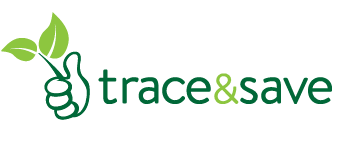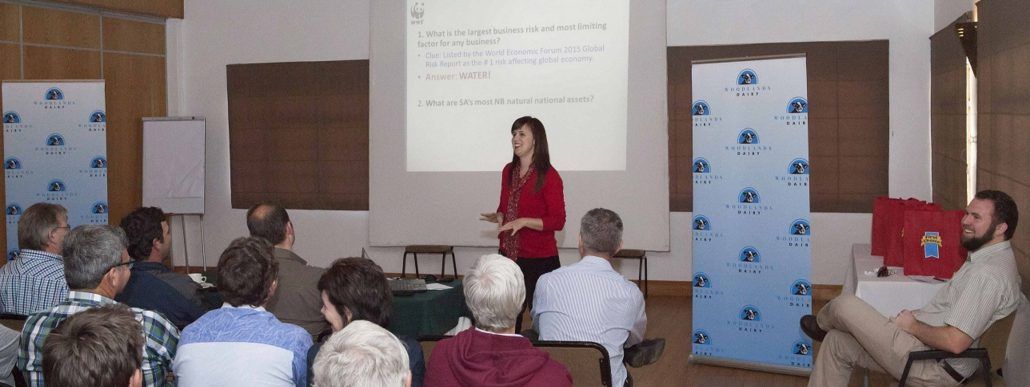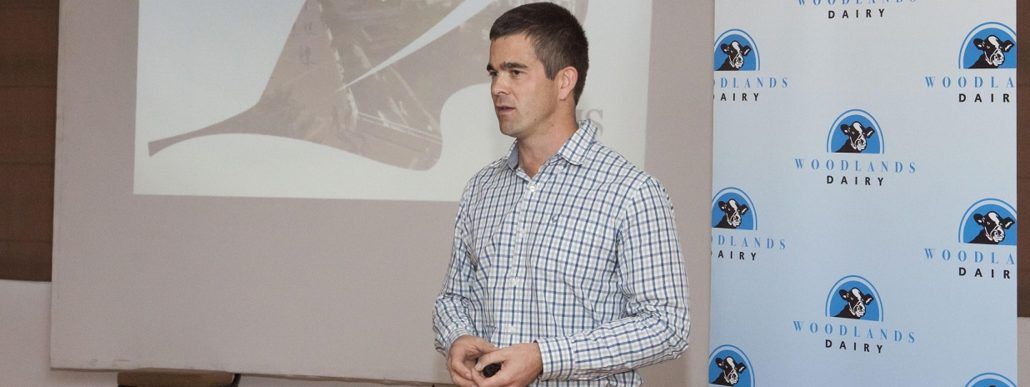We had an encouraging, insightful day at Mentors Country Estate on the 11th of August 2016 at the environmental stewardship symposium. Speakers from the World Wide Fund for Nature-SA (WWF-SA), Stellenbosch University, the South African Milk Producer Organisation (MPO), Conservation Outcomes, Woodlands Dairy and Trace & Save presented on topics relating to environmental and water stewardship, soil and pasture management, biodiversity conservation and sustainable agriculture.
Sue Viljoen from WWF-SA presenting at the Environmental Stewardship Symposium. Photo by: Impact
Sue Viljoen, Water Stewardship Project Manager – Mondi Wetlands Programme from WWF-SA was the keynote speaker. She spoke on the opportunities that dairy farmers have as stewards of biodiversity and water resources. She emphasized that water crises is one of the top three risks to global growth and sustainability. Water stewardship is necessary in order to become more efficient in water use, ensuring limited waste and protecting freshwater resources. Riparian areas (the areas surrounding rivers) and wetlands are the most important natural asset to a farmer. She encouraged farmers to see their ecological infrastructure as assets, and that they should take stock of what they have. For example, she gave farmers some pointers on how to evaluate whether their riparian zones are in a healthy condition. Other ecological infrastructure that farmers should consider is rivers, wetlands, areas of natural vegetation, corridors and rare or threatened species. Trace & Save provides farmers with the support to do this.
Dr Pieter Swanepoel from Stellenbosch University presenting on the biodiversity benefits of multi-species pasture crops. Photo by: Impact
Dr. Pieter Swanepoel from Stellenbosch University Department of Agronomy, presented on the biodiversity benefits of multi-species pasture crops. He encouraged farmers to consider planting multiple plant species in their pastures, pointing out the benefits (and limitations) thereof. The main benefits he mentioned were potential increased forage yield, better herbage quality, the complete use of available resources, better nutrient retention and recycling in the soil, greater pasture stability, reduced invasion by weeds and the alleviation of disease pressure. Two limitations he pointed out, and said that farmers should consider when planting multi-species crops, are that the botanical composition changes through time and does not stay consistent, and that grazing management practices should take into consideration the properties of all of the species in the pasture. He also directed farmers to a website which can support them in deciding what pasture species to plant when considering a mixed ley.
Barbara Bieldt the Manager of Market Protection & Development shared the MPO’s vision of sustainable dairy farming for everyone. Bieldt said that dairy farmers are stewards of the environment, product integrity, farm animals and people of communities and that environmental stewardship and sustainability forms part of the “Market Protection & Development”-pillar of the MPO. Wentzel Coetzer of Conservation Outcomes presented the opportunities that are available regarding biodiversity stewardship, specifically introducing the Greater Kromme Stewardship Project, a biodiversity stewardship project being rolled out in the Kromme River catchment area in the Eastern Cape. Portia Phohlo, of Trace & Save and the Woodlands Dairy Sustainability Project, showed the influence of management practices on soil health while Craig Galloway, also of Trace & Save and the Woodlands Dairy Sustainability Project, presented how economic efficiency on dairy farms relates to sustainability indicators as used in the Trace & Save SWAN System®.
The farmers who attended were provided with a fresh perspective and encouragement on how to approach environmental stewardship on their farms. By hosting informative farmer-days like these, Trace & Save and Woodlands Dairy present the resources for sustainability and shares research results encouraging dairy farmers to farm for future generations.
- A carbon footprint assessment for pasture-based dairy farming systems in South Africa - 2024-02-07
- What progress have farms participating with Trace & Save made over the past 10 years? - 2023-09-06
- Carbon footprint reduction over time: Lessons from pasture-based dairy farms in South Africa - 2023-09-04


